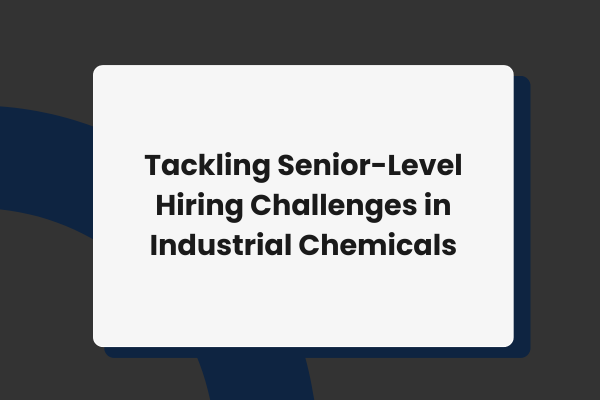Talent Shortages and Skills Gaps in Industrial & Speciality Chemicals
The industrial and speciality chemicals sector is working with a growing talent crunch. As many long-term professionals retire, companies are struggling to find qualified replacements. One industry analysis warns that by 2025, a “large portion” of the chemical workforce, especially baby boomers, will retire, creating serious talent gaps. This leaves critical roles in R&D, operations, and regulatory affairs vacant, threatening innovation and productivity. Companies report they struggle to find skilled workers, especially technicians and engineers. Demand for high-level chemists and engineers is strong, but the supply of qualified candidates is low.
- Retirement: A large portion of chemical-industry employees are over 50 and nearing retirement. This creates a large staffing gap and an urgent need to hire new talent that is correctly qualified for the open roles.
- STEM pipeline decline: Engineering enrolments are falling. With fewer new grads, businesses are struggling to fill specialised roles.
- Competition from tech and other sectors: High-profile tech companies actively recruit chemical engineers. Many potential candidates prefer the idea of tech/IT to process manufacturing.
- Global growth and regulation: Speciality chemicals are booming in areas like batteries, advanced materials and green chemistry. Stricter environmental and safety regulations demand new expertise. Companies need talent versed in digital tools (AI, analytics) and sustainability.
Bridging the Skills Gap: Emerging In-Demand Expertise
Beyond sheer headcount shortages, firms face critical skill gaps in their talent pools. Younger hires often bring strong technical fundamentals but lack the practical experience and specialised knowledge needed for complex chemical operations. In response, chemical companies are increasingly prioritising new skills:
- Digital transformation & data analytics: Industry 4.0 is here. Companies seek candidates who can lead factory automation, machine learning, and real-time process optimisation. Data scientists and automation engineers are in high demand.
- Sustainability: With net-zero and circular economy goals, firms need experts in eco-friendly processes, renewable feedstocks, and waste reduction.
- Regulatory and compliance expertise: As global regulations get tighter, companies require senior leaders who understand evolving chemical safety laws.
- Cross-disciplinary R&D leaders: R&D heads must blend deep science with commercial knowledge. Companies entering life sciences or semiconductor materials are even recruiting PhDs from academia for their R&D teams. These niche roles, combining research credentials with business leadership, have very few ready candidates.
The profile of an ideal candidate has changed. Filling senior R&D, regulatory or commercial-leadership roles often requires rare mixes of skills. Even when candidates can be hired, truly qualified leaders are hard to find.
Retention Challenges: Keeping Your Teams
While hiring new talent is hard, retaining existing employees is equally difficult. Competitive and cultural factors can strain retention in specific areas:
- Flexible work and experience: Many senior experts value flexible schedules, remote/hybrid options, and respect for their legacy knowledge. Businesses offering flexibility and mentoring roles for veteran staff can improve retention.
- Competitive compensation and career growth: The market for specialised talent is tight, so salary expectations have risen. Clear career paths and development opportunities (e.g. advanced training in new technologies) can help motivate talent.
- Strong safety/culture focus: Professionals in chemicals deeply value a safety-first culture and clear regulatory ethos. Employers who prioritise robust training programs, safety certifications, and ethical practices build loyalty among technical staff.
- Engaging younger workers: Millennials and Gen Z seek purpose and growth. Employers must brand themselves as innovators and offer modern workplaces with the right tech tools.
Retention is more than just good paychecks. The best companies create a culture of respect, learning, and inclusion.
The Executive Search Imperative
These pressures intensify at the senior level. Recruiting C-suite executives, VPs of R&D, Heads of Regulatory, and other leadership roles is especially difficult, there is more competition. These positions require deep technical expertise and business leadership. Companies often need global experience and soft skills that take decades to develop.
What this means for HR leaders: filling executive roles often takes very long search cycles. It also means casting a wider net – tapping global networks, considering non-traditional backgrounds and assessing transferable leadership qualities. As a result, most companies partner with specialised recruiters who already have pipelines of senior candidates.
Senior leaders don’t just “fill a chair” – losing or failing to recruit one means strategic paralysis. Having an expert talent partner can make the difference between months of failed interviews and a successful long-term hire.
Partnering with Mackinnon Bruce International
Navigating these talent challenges demands a proactive, expert approach. At Mackinnon Bruce, we specialise in executive search for industrial and speciality chemicals. Our consultants combine decades of sector experience with a global network of senior professionals. We understand the highly technical requirements of roles in R&D, regulatory, operations, and commercial leadership, as well as the importance of cultural fit and leadership style. By conducting thorough industry mapping and confidential outreach, we help clients identify hidden gems of talent (candidates who may not be actively looking but are open to the right opportunity).
Companies that confront retirements, close skills gaps, and invest in retention will strengthen their competitive edge. As you refine your hiring strategy in 2025 and beyond, consider Mackinnon Bruce as your strategic partner. We can help you build the leadership bench you need, ensuring that critical roles don’t remain vacant.
Sources
https://blog.agchemigroup.eu/the-chemical-industrys-next-great-shortage-skilled-labour
https://www.bls.gov/ooh/life-physical-and-social-science/chemists-and-materials-scientists
https://www.jacgroup.com/en/news/market/news101843
https://www.jacgroup.com/en/news/market/news101843.html#:~:text=





